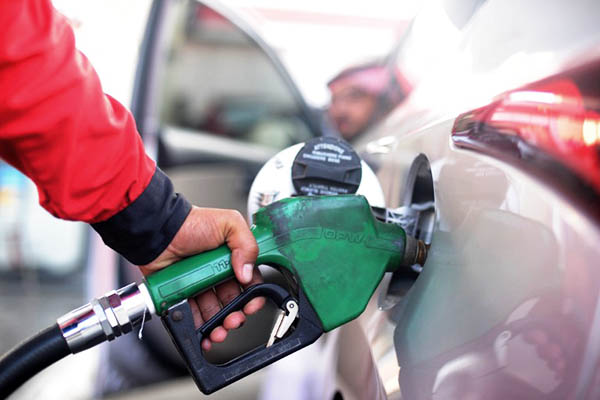
File photo. Amer Hilabi—AFP
Petrol price hits Rs. 145.8/liter, while diesel reaches Rs. 142.6; kerosene Rs. 116.5/liter and light diesel Rs. 114/liter
Pakistan’s Ministry of Finance early on Friday notified a fresh hike in fuel prices—less than a week after the Pakistan Tehreek-e-Insaf (PTI)-led government had claimed that Prime Minister Imran Khan had refused to increase tariffs in November to “provide relief to the public.”
“If the government had accepted OGRA’s recommendation, the new prices would have been much higher,” read the notification issued by the Finance Division around 1:30 a.m. Stressing that petroleum prices had been increased “partially,” it claimed that the government had “absorbed the bulk of the pressure after making adjustments in the Sales Tax and Petroleum Levy.”
Claiming that the government was aware of its “responsibility” to provide relief to consumers, it added: “This has dented the Petroleum Levy budget of Rs. 152.5 billion during July-September 2021, as compared to Rs. 20 billion realized only.”
According to the notification, the new fuel prices come into effect immediately and would be maintained for the next two weeks. Petrol prices, it says, have been hiked by Rs. 8.03, bringing them to a record-breaking Rs. 145.82/liter from Rs. 137.79. Similarly, high-speed diesel tariffs have been hiked by Rs. 8.14, bringing them to Rs. 142.62/liter from Rs. 134.48.
The prices of kerosene have been raised by Rs. 6.27/liter, from Rs. 110.26 to Rs. 116.53/liter, while the price of light diesel oil has been increased by Rs. 5.72/liter from Rs. 108.35 to Rs. 114.07/liter.
This is the first time in Pakistan’s history that prices of all petroleum products have risen above Rs. 110/liter.
On Nov. 1, the Prime Minister’s Office had issued a statement claiming that the prime minister had rejected a proposal of the Oil and Gas Regulatory Authority (OGRA) to increase fuel prices in November “to provide relief to the public.” It said that the government had decided to prioritize “relief” instead of “passing on the impact of global inflationary pressures.” This largesse proved short-lived.
On Nov. 3, just three days after the earlier statement, Prime Minister Imran Khan announced in a nationally televised address that the government would “soon” be increasing fuel prices, as retaining prices at their current levels would boost the country’s economic deficit. On Friday morning, the government implemented his warning.
Observers believe the latest price hike is linked to the resumption of a suspended $6 billion Extended Fund Facility from the International Monetary Fund. Earlier this week, Adviser to the P.M. on Finance Shaukat Tarin announced that the government had no choice but to boost fuel prices, as the global lender would not allow it to subsidize the commodity for the common man.
